Native Pollinators and Conservation
Here are some recommended resources:
UMass Resources: see our new Educational Briefs tab to learn more about pollinators in and around Massachusetts!
Other Resources:
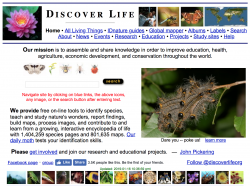 Discoverlife.org is a free on-line tool to identify plant and animal species, including pollinators. This site allows the user to report findings, build maps, process images and contribute to and learn from a growing interactive encyclopedia of live with nearly 1.5 million species pages and 800,000 maps. Click here to see a short video on how to use Discover Life.
Discoverlife.org is a free on-line tool to identify plant and animal species, including pollinators. This site allows the user to report findings, build maps, process images and contribute to and learn from a growing interactive encyclopedia of live with nearly 1.5 million species pages and 800,000 maps. Click here to see a short video on how to use Discover Life. 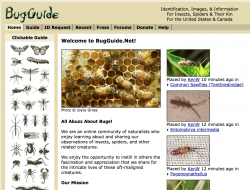 BugGuide.net is an online community of naturalists who enjoy learning about and sharing our observations of insects, spiders, and other related creatures. This is a great site to look up pollinators and to post observations of your own where they will be identified by a team of scientists.
BugGuide.net is an online community of naturalists who enjoy learning about and sharing our observations of insects, spiders, and other related creatures. This is a great site to look up pollinators and to post observations of your own where they will be identified by a team of scientists.
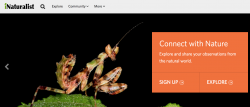 iNaturalist (a joint initiative by the California Academy of Sciences and the National Geographic Society) helps you identify plant and animal species, and provides a platform to record your observations for use by scientists.
iNaturalist (a joint initiative by the California Academy of Sciences and the National Geographic Society) helps you identify plant and animal species, and provides a platform to record your observations for use by scientists.
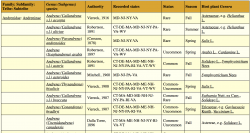 Specialist bees of the Mid-Atlantic and Northeastern United States website by Jarrod Fowler and Sam Droege provides a summary of Mid-Atlantic and Northeastern native specialist bees listed alphabetically with associated host plant families.
Specialist bees of the Mid-Atlantic and Northeastern United States website by Jarrod Fowler and Sam Droege provides a summary of Mid-Atlantic and Northeastern native specialist bees listed alphabetically with associated host plant families.
Really cool photographs of bees:
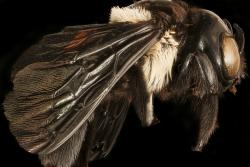 The USGS Bee Inventory and Monitoring lab maintains an impressive Flickr account, containing high resolution images that can be used by the public.
The USGS Bee Inventory and Monitoring lab maintains an impressive Flickr account, containing high resolution images that can be used by the public.
General Information about pollinator conservation:
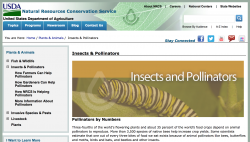 The USDA National Resources Conservation Service contains extensive information about pollinators, including information about Monarch and Honey Bee conservation efforts, and resources about becoming a pollinator-friendly farmer or gardener. This includes information about backyard conservation and planting for pollinators.
The USDA National Resources Conservation Service contains extensive information about pollinators, including information about Monarch and Honey Bee conservation efforts, and resources about becoming a pollinator-friendly farmer or gardener. This includes information about backyard conservation and planting for pollinators.
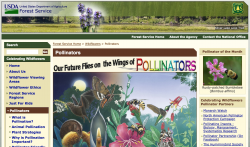 The U.S. Forest Service Pollinator page contains links to a variety of pollinator resources including “Gardening for Pollinators”, “Pollinator BMP’s for Federal lands” (which can be adapted for agencies or private property), and information about the National Strategy to Promote the Health of Honey Bees and Other Pollinators.
The U.S. Forest Service Pollinator page contains links to a variety of pollinator resources including “Gardening for Pollinators”, “Pollinator BMP’s for Federal lands” (which can be adapted for agencies or private property), and information about the National Strategy to Promote the Health of Honey Bees and Other Pollinators.
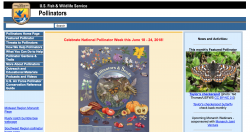 The U.S. Fish and Wildlife Pollinator home page contains podcasts, webcasts, and curriculum material on how to help pollinators. It includes links to additional webpages on pollinator conservation in the United States.
The U.S. Fish and Wildlife Pollinator home page contains podcasts, webcasts, and curriculum material on how to help pollinators. It includes links to additional webpages on pollinator conservation in the United States.
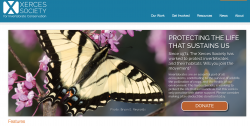 The website for the Xerces Society for Invertebrate Conservation contains numerous resources about Bumble Bee and Monarch conservation. The site also contains information about workshops, webinars, print resources, and citizen science projects that you can get involved in!
The website for the Xerces Society for Invertebrate Conservation contains numerous resources about Bumble Bee and Monarch conservation. The site also contains information about workshops, webinars, print resources, and citizen science projects that you can get involved in!
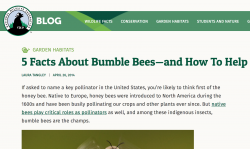 This National Wildlife Federation blog has some fun facts about bumble bees, and info about how to help them.
This National Wildlife Federation blog has some fun facts about bumble bees, and info about how to help them.
University websites with info about native bees:
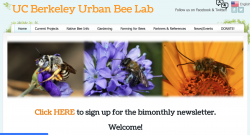 The UC Berkeley Urban Bee Lab website has Information on native bee biology and diversity, gardening for bees, farming for bees, and links to numerous online websites and books.
The UC Berkeley Urban Bee Lab website has Information on native bee biology and diversity, gardening for bees, farming for bees, and links to numerous online websites and books.
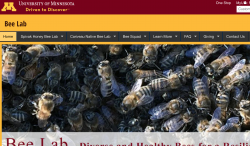 The University of Minnesota Bee Lab website has information on native bees and managed honeybees
The University of Minnesota Bee Lab website has information on native bees and managed honeybees
